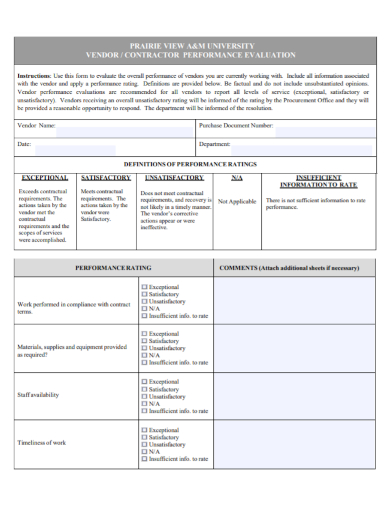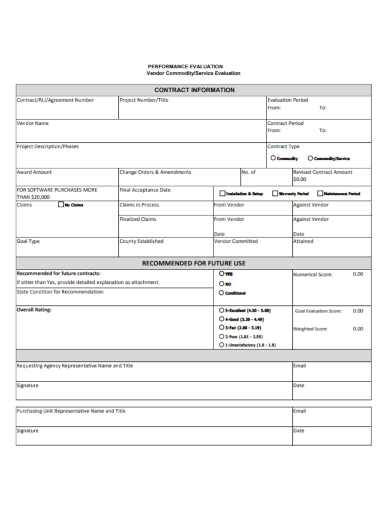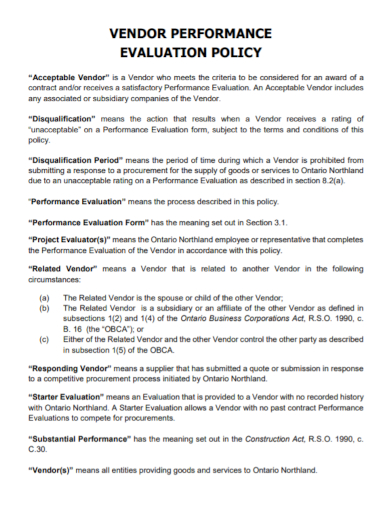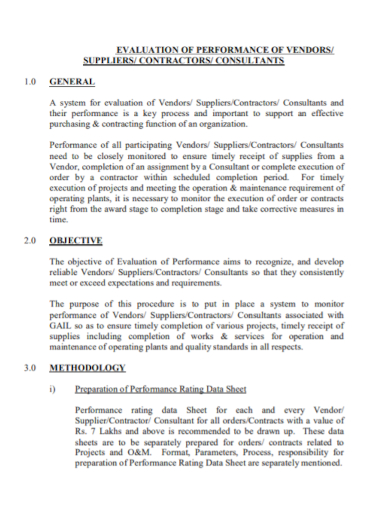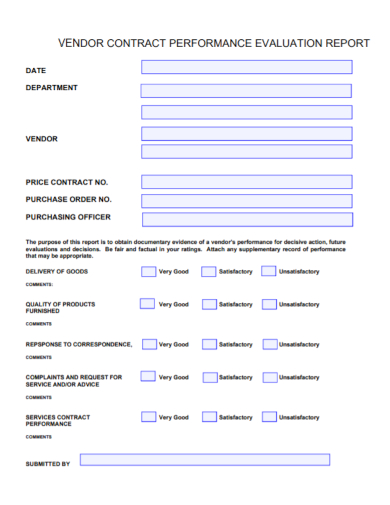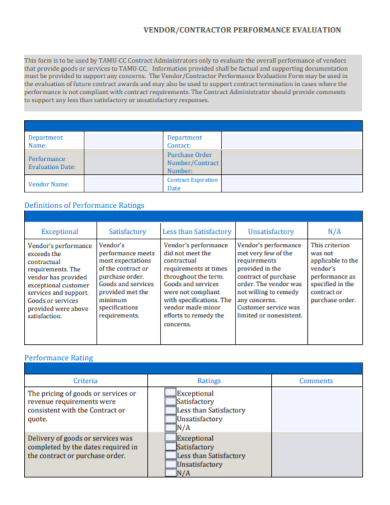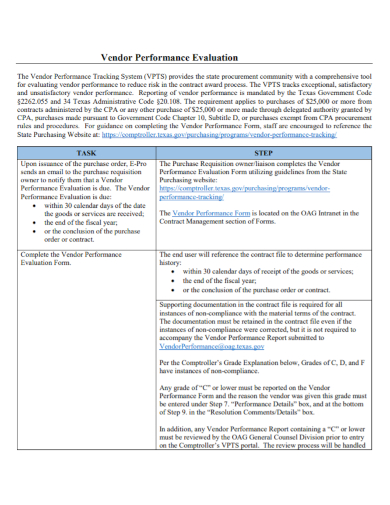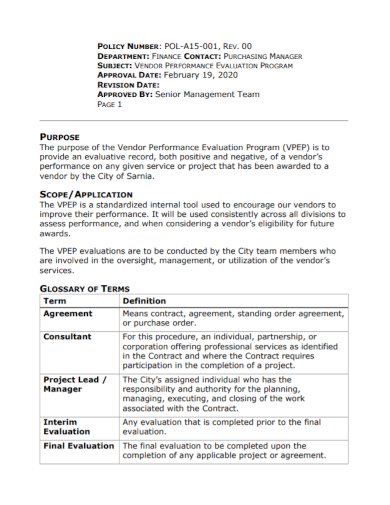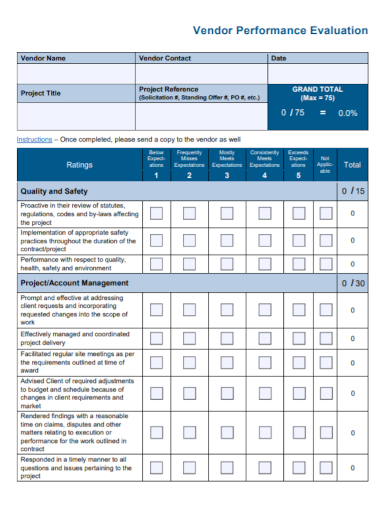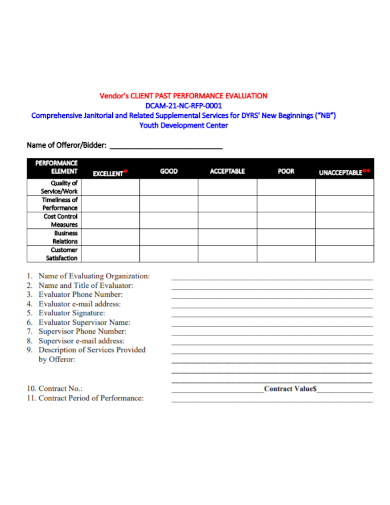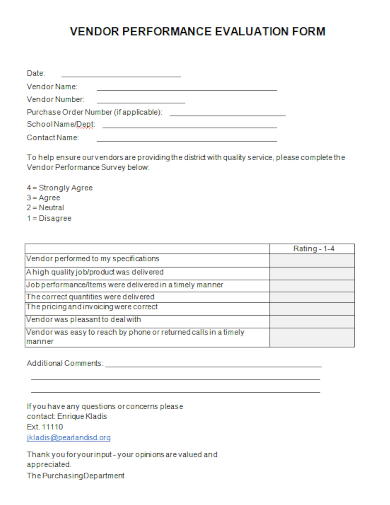Part of the vendor evaluation process is to make sure of the efficiency of a vendor’s performance. Business organization need to have a solid evaluation plan during a vendor onboarding or even as an existing business partner, to make sure of the internal and external accountability and justification for a continuing relationship. To be able to measure the quality of work performance check out our free vendor performance evaluation samples below:
10+ Vendor Performance Evaluation Samples
1. Vendor Contractor Performance Evaluation
2. Vendor Service Performance Evaluation
3. Vendor Performance Evaluation Policy
4. Vendor Consultant Performance Evaluation
5. Vendor Performance Evaluation Report
6. Vendor Performance Evaluation Form
7. Business Vendor Performance Evaluation
8. Vendor Performance Evaluation Program
9. Vendor Project Performance Evaluation
10. Vendor Client Past Performance Evaluation
11. Sample Vendor Performance Evaluation Form
What Is a Vendor Performance Evaluation?
Vendor Performance Evaluation or Supplier Performance Evaluation is a process that determines if the vendor is performing their work as expected. What is expected of the supplier should be as described in the supply contract or statement of work, specification, service level agreement. Measuring of vendor’s performance help prevent product issues and post-payment defects and drive improvements in the supply chain.
How Should Vendor Performance Evaluation Be Created?
There are a number of factors to consider while evaluating a vendor or supplier’s performance depending on the nature of a vendor product or service. This may have different considerations depending on whether we are buying goods or services. However, they typically address similar areas, which are important for the performance evaluation. But overall, the main objective of the whole evaluation process is to reduce purchase risk and maximize the overall value of the purchaser. Here are some key points to consider:
I. Performance Rating
Like most evaluations, rating scales are used in performance management systems to indicate the level of performance or achievement of a vendor. Performance rating scales are usually in a 5-point scale or it could be narrative.
II. Evaluation Criteria or Performance Indicators
These are standards by which accomplishments of required technical and operational effectiveness and the suitability characteristics or the resolution of operational issues that may be assessed. Here are some basic examples for determining what criteria are to be used:
- Quality and Safety : Inspection checks help detect any visible product defects, rejections, and returns. For services, must check for low re-work, errors or complaints. Implementation of safety practices.
- Quantity : Comparison between quantities ordered versus the actual delivered products, if it hits the proposed number as per agreement
- Timeliness : Delivery of goods or services has been completed by the required dates in contract or purchase order
- Pricing : The pricing of goods or services are consistent with the contract
- Regulatory Compliance: Working within legal standards, health and safety protocols or organizational guidelines.
- Productivity and Service: Some indicators of service excellence include response times for resolving issues, and constant client satisfaction. Effective output and process efficiency.
III. Suppliers for Review/ Feedback
A company should always open their communication channels with their suppliers or vendors, so it is also essential to pay attention to the opposite team. Due to feedback conversations, this can clear misunderstandings. Evaluations is a two way process of trying to understand the side of the other party as well.
IV. Action Plan
After a careful evaluation, a proposed action plan should be implemented most especially if there are a number of cases that must be seriously addressed by the company. This would help identify performance gaps and devise strategies to block them.
FAQs
What Is a Supplier Selection?
This is the process of selecting a supplier to acquire the necessary materials to support the outputs of organizations. Firms identify, evaluate, and then establish a contract with potential suppliers.
What Is a Vendor Risk Management?
A vendor risk management or VRM is the practice of evaluating business partners, suppliers, or third-party vendors both before a business relationship is established and during the duration of your business contract.
What Is a Supplier Integrity?
This is a platform designed to automate the compliance and integrity risk assessment of your suppliers, and easily integrates with your existing tools and processes.
The importance of a vendor performance evaluation is to ensure of a productive and efficient steady flow in the supply chain. It is a initial precautionary step business organizations take as they must be able to control early on any discrepancies and error in regards to their vendors or suppliers and keep them in check.
Related Posts
FREE 10+ Scholarship Evaluation Samples [ Interview, Training, Monitoring ]
FREE 10+ Dependability Evaluation Samples in PDF | DOC
FREE 10+ Quantity of Work Evaluation Samples [ Employee, Self, Performance ]
FREE 10+ Heuristic Usability Evaluation Samples [ Website, Testing, Inspection ]
FREE 10+ Job Knowledge Evaluation Samples [ Employee, Skills, Self ]
FREE 10+ Consultant Performance Evaluation Samples in PDF | DOC
FREE 10+ Job Interview Evaluation Samples [ Teacher, Candidate, Performance ]
FREE 10+ Grant Proposal Evaluation Samples in PDF | DOC
FREE 10+ Faculty Performance Evaluation Samples in PDF | DOC
FREE 10+ Internship Evaluation Samples [ Supervisor, Self, Performance ]
FREE 10+ Resident Evaluation Samples [ Medical, Self, Rotation ]
FREE 10+ Dissertation Evaluation Samples [ Critical, Service, Self ]
FREE 3+ Front Desk Evaluation Samples [ Performance, Receptionist, Employee ]
FREE 10+ Thesis Evaluation Samples [ Master, Defense, Project ]
FREE 10+ Student Evaluation Samples [ Teacher, Self, Performance ]

